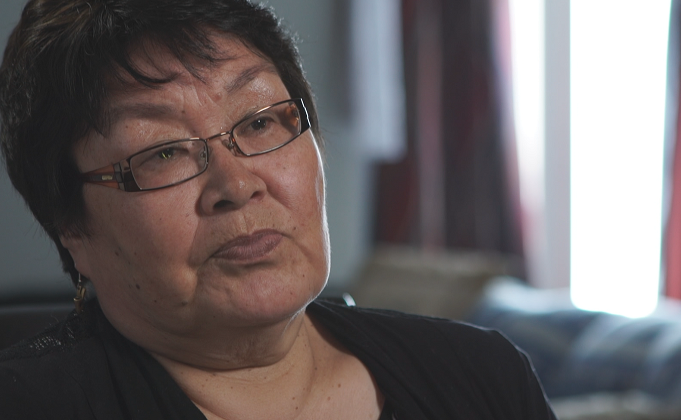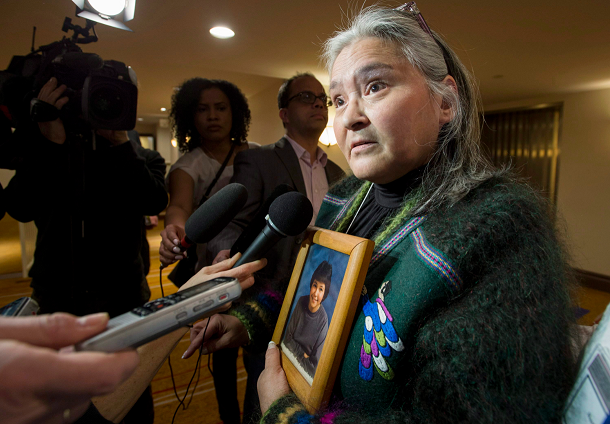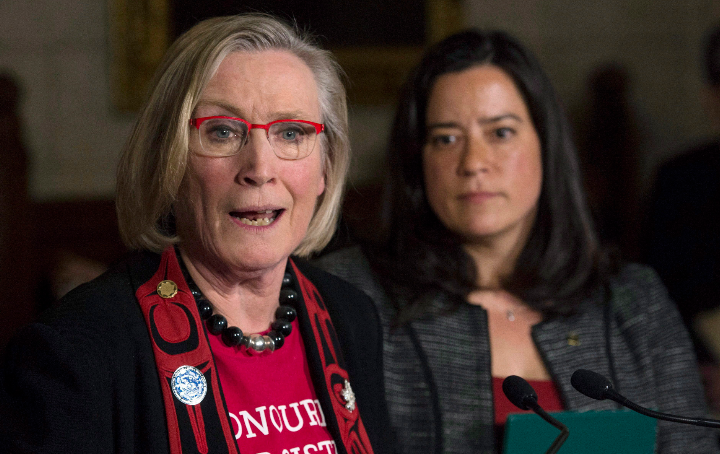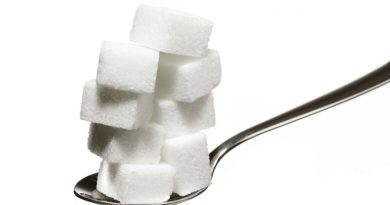Canadian Inuit women’s organization slams federal government

The president of Canada’s Inuit women’s organization is slamming the federal government over its handling of the upcoming National Inquiry into Missing and Murdered Indigenous Women and Girls after a list of possible commissioners was leaked last week, with no Inuk named among them.
“As Inuit women, most of us live in regions with the highest rates of violence in the country,” Pauktuutit president Rebecca Kudloo said in a statement released on Friday. “I cannot understand how in 2016 we are still not being included in our own right as full participants in these historic opportunities.”
Canadian newspaper The Globe and Mail reported last week that the five possible inquiry commissioners included: Marion Buller, a First Nations judge in the western Canadian province of British Columbia; former Native Women’s Association of Canada (NWAC) president Michèle Audette; Marilyn Poitras, a Métis law professor at the University of Saskatchewan; Qajaq Robinson, a lawyer who grew up in Nunavut; and a First Nations lawyer who served on the Human Rights Tribunal of Ontario but who went unnamed in the report.
Kudloo stressed that Qajaq Robinson from Nunavut is an accomplished lawyer but that by choosing her, the government was excluding Inuit from issues that directly affect them as has happend in the past.
The Truth and Reconciliation Commission, which looked at the legacy of residential schools in Canada, wrapped up in 2015 and didn’t have an Inuk commissioner either and the 94 recommendations that came out of it mostly concerned First Nations, Kudloo said.
“Once again, we’re going to have a non-Inuk speaking for us,” she told Eye on the Arctic in a phone interview on Monday. “We want to be at the forefront of this inquiry, not working in the background. Again.”
Facing violence against indigenous women

The National Inquiry on Missing and Murdered Indigenous Women is being called in Canada to examine issues around the high number of missing and murdered indigenous women in the country. The Royal Canadian Mounted Police (RCMP), the country’s national police force, issued a report in 2014 saying Aboriginal women were over-represented in the numbers of missing and murdered women in the country. The RCMP report said there have been 1,181 missing or murdered Aboriginal women between 1980 and 2012, but activists believe the number is many times higher.
Indigenous families and organizations have pushed for an inquiry for years as a way to force the country to confront violence against indigenous women and examine whether their cases are effectively investigated by law enforcement.
The federal government began a consultation process late last year that wrapped up this February. During that period, Canada’s Indigenous Affairs Minister Carolyn Bennett and Status of Women Minister Patty Hajdu, travelled the country speaking to affected families asking them what they wanted to see from the inquiry and what changes they hoped would come out of it.
During the pre-consultation process for the inquiry, Pauktuutit recommended that two Inuit commissioners be included: one woman and one man. However, if only one Inuk commissioner could be named, Pauktuutit said it should be a woman.
To see no Inuk on the list is a blow to the Inuit women of Canada, Pauktuutit said.
“We have worked diligently as diplomats and negotiators, as is our way as Inuit,” Kudloo said in her statement. “We have been feeling increasing pressure from many Inuit to update them on the inquiry. We now feel we have no choice but to make a public statement about our concerns as a national indigenous women’s organization and on behalf of all Inuit women in Canada.”
Need to examine Inuit-specific issues

Canada’s Liberal Prime Minister Justin Trudeau was elected in 2015 and campaigned on a promise of reconciliation with Canada’s aboriginal population and the launch of the inquiry.
Although Canada’s First Nations, Métis and Inuit share a common history when it comes to the experience of colonization and residential schools in the country; their individual cultures, issues and political aspirations are extremely varied. Despite this,when First Nations, Métis and Inuit concerns become part of the national conversation they are often grouped together by media and politicians.
The four Inuit regions of Canada are found in the most remote and inaccessible parts of the country where there are few resources or social services and where violence against women most often comes from family members and domestic partners. Since talk of the inquiry began, everyone from Pauktuutit to Terry Audla, the former president of Canada’s National Inuit Association, Inuit Tapiriit Kanatami (ITK), has stressed the need for an Inuit-specific approach when it comes to violence against women in the Arctic.
When Indigenous and Northern Affairs Minister Carolyn Bennett visited the Arctic Canadian city of Iqaluit for consultations this year, she told reporters that what works in the South wouldn’t necessarily work in the North , making the lack of an Inuk commissioner all the more surprising, said Kudloo.
“We will try right until the bitter end to convince them to get an Inuk commissioner,” she said.
Canada’s Department of Indigenous and Northern Affairs did not return request for comment for this story before deadline.
Canada’s National Inuit organization, ITK, said on Monday they will not be commenting on Pauktuutit’s concerns until inquiry details are formally released.
The date of the inquiry has yet to be confirmed.
Write to Eilís Quinn at eilis.quinn(at)cbc.ca
Related stories from around the North:
Canada: Final Truth & Reconciliation report released in Canada, Eye on the Arctic
Denmark: Nordics report high abuse levels against women, Radio Sweden
Sweden: Reports of violent crime increasing in Sweden’s North, Radio Sweden
United States: Survey finds violence against women widespread in Western Alaska region, Alaska Dispatch News



